外研版(2019)必修第三册Unit4 Amazing art-Developing ideas课件(41张ppt)
文档属性
| 名称 | 外研版(2019)必修第三册Unit4 Amazing art-Developing ideas课件(41张ppt) |  | |
| 格式 | zip | ||
| 文件大小 | 6.8MB | ||
| 资源类型 | 教案 | ||
| 版本资源 | 外研版(2019) | ||
| 科目 | 英语 | ||
| 更新时间 | 2021-12-28 22:35:53 | ||
图片预览

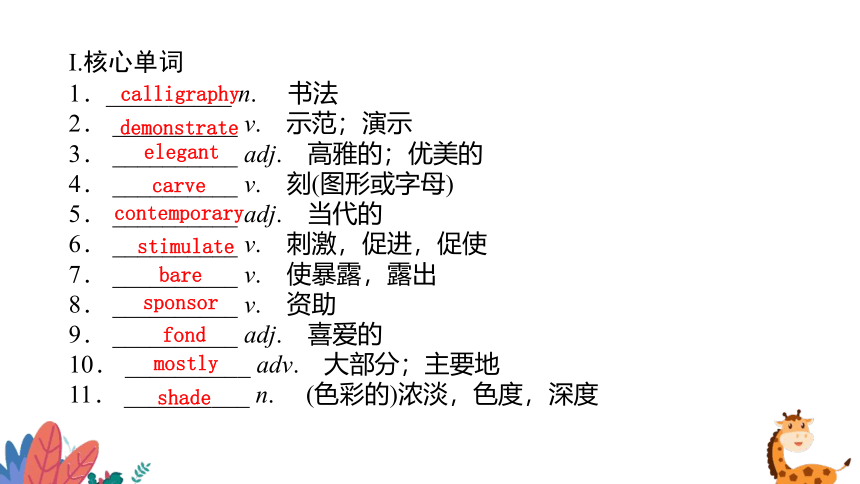
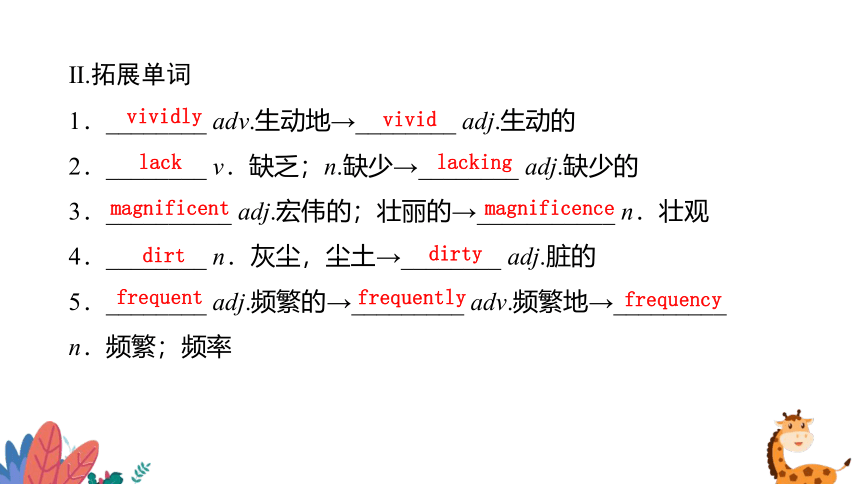
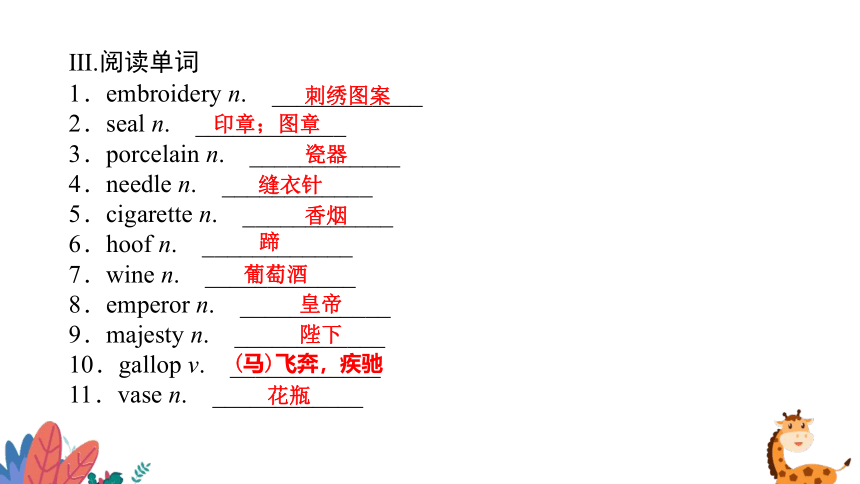
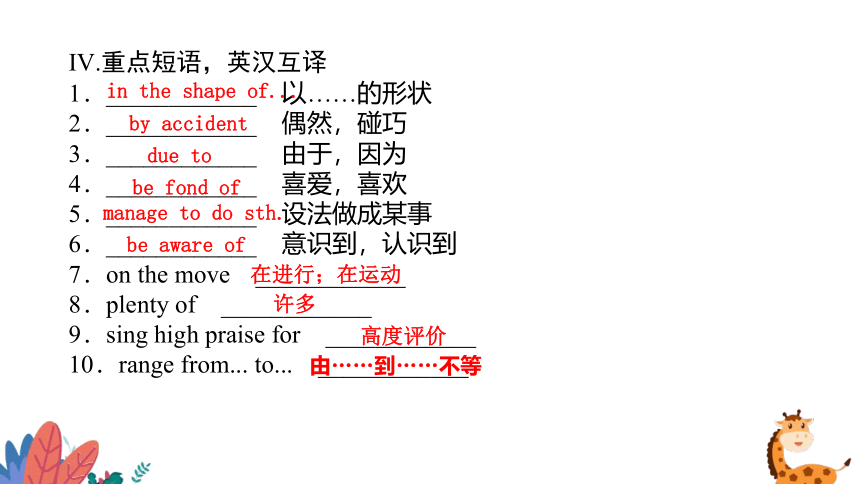
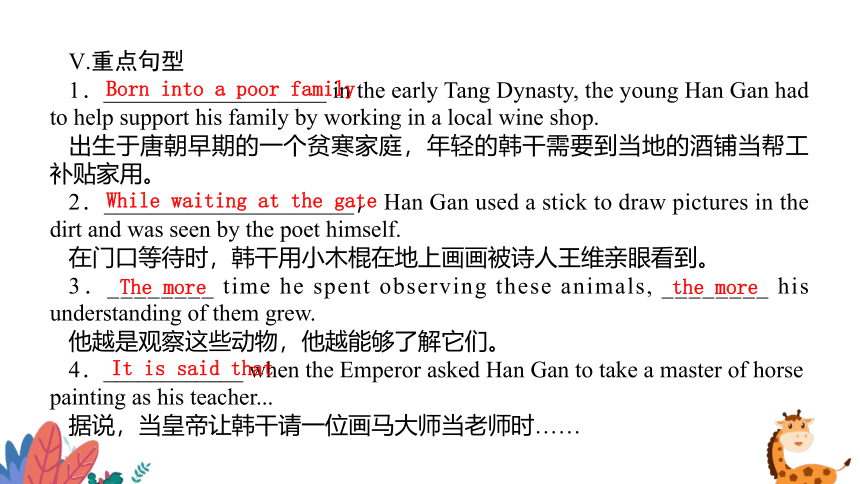
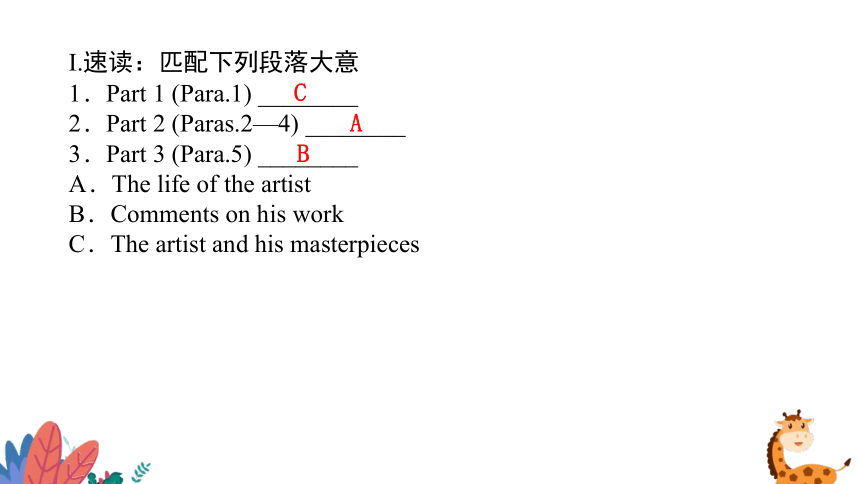
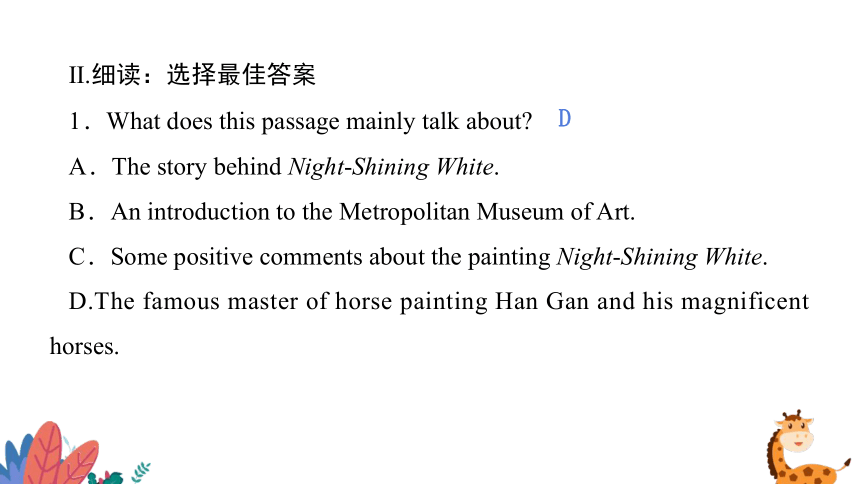
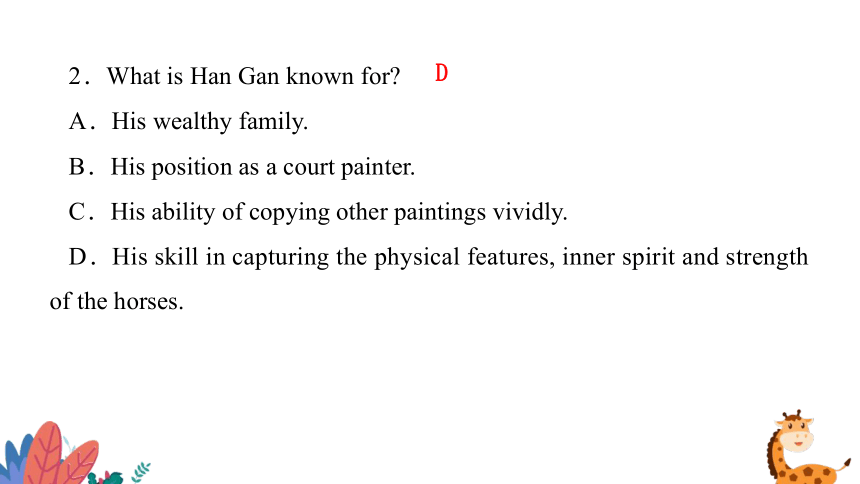
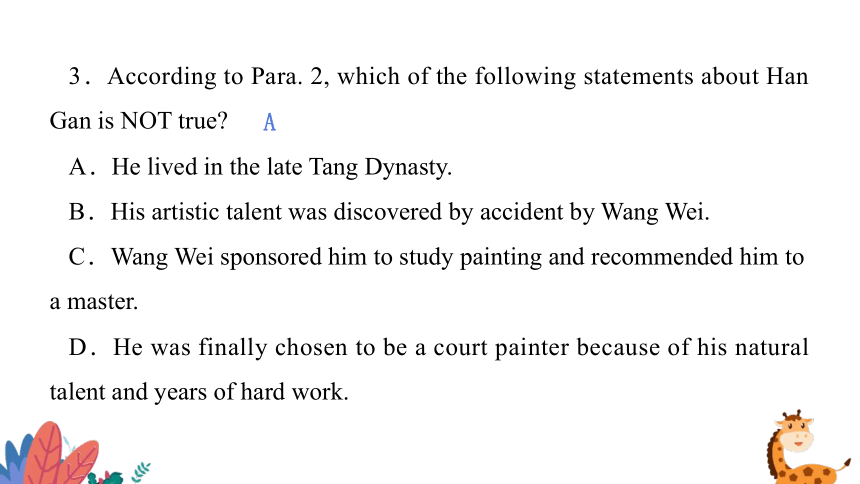
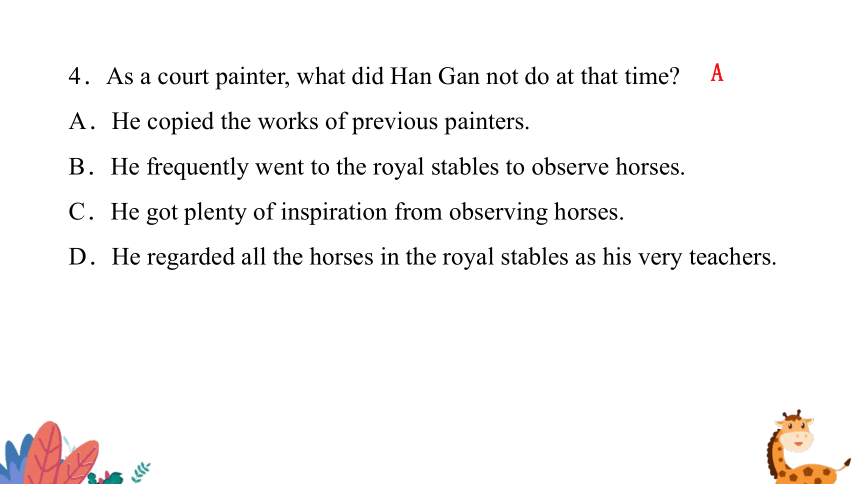
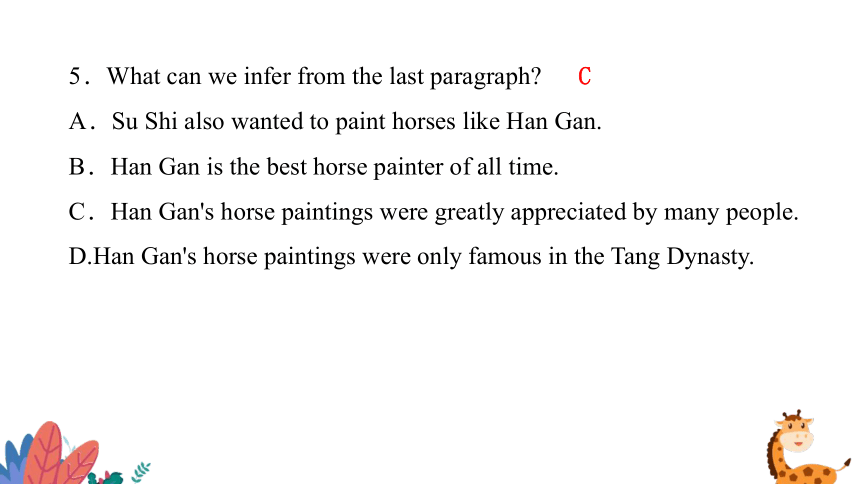
文档简介
(共41张PPT)
Section Ⅲ Developing ideas
Ⅰ.核心单词
1.__________ n. 书法
2. __________ v. 示范;演示
3. __________ adj. 高雅的;优美的
4. __________ v. 刻(图形或字母)
5. __________ adj. 当代的
6. __________ v. 刺激,促进,促使
7. __________ v. 使暴露,露出
8. __________ v. 资助
9. __________ adj. 喜爱的
10. __________ adv. 大部分;主要地
11. __________ n. (色彩的)浓淡,色度,深度
calligraphy
demonstrate
elegant
carve
contemporary
stimulate
bare
sponsor
fond
mostly
shade
Ⅱ.拓展单词
1.________ adv.生动地→________ adj.生动的
2.________ v.缺乏;n.缺少→________ adj.缺少的
3.__________ adj.宏伟的;壮丽的→___________ n.壮观
4.________ n.灰尘,尘土→________ adj.脏的
5.________ adj.频繁的→_________ adv.频繁地→_________
n.频繁;频率
vividly
vivid
lack
lacking
magnificent
magnificence
dirt
dirty
frequent
frequently
frequency
Ⅲ.阅读单词
1.embroidery n. ____________
2.seal n. ____________
3.porcelain n. ____________
4.needle n. ____________
5.cigarette n. ____________
6.hoof n. ____________
7.wine n. ____________
8.emperor n. ____________
9.majesty n. ____________
10.gallop v. ____________
11.vase n. ____________
刺绣图案
印章;图章
瓷器
缝衣针
香烟
蹄
葡萄酒
皇帝
陛下
(马)飞奔,疾驰
花瓶
Ⅳ.重点短语,英汉互译
1.____________ 以……的形状
2.____________ 偶然,碰巧
3.____________ 由于,因为
4.____________ 喜爱,喜欢
5.____________ 设法做成某事
6.____________ 意识到,认识到
7.on the move ____________
8.plenty of ____________
9.sing high praise for ____________
10.range from... to... ____________
in the shape of...
by accident
due to
be fond of
manage to do sth.
be aware of
在进行;在运动
许多
高度评价
由……到……不等
Ⅴ.重点句型
1.___________________ in the early Tang Dynasty, the young Han Gan had to help support his family by working in a local wine shop.
出生于唐朝早期的一个贫寒家庭,年轻的韩干需要到当地的酒铺当帮工补贴家用。
2._____________________, Han Gan used a stick to draw pictures in the dirt and was seen by the poet himself.
在门口等待时,韩干用小木棍在地上画画被诗人王维亲眼看到。
3.________ time he spent observing these animals, ________ his understanding of them grew.
他越是观察这些动物,他越能够了解它们。
4.____________ when the Emperor asked Han Gan to take a master of horse painting as his teacher...
据说,当皇帝让韩干请一位画马大师当老师时……
Born into a poor family
While waiting at the gate
The more
the more
It is said that
Ⅰ.速读:匹配下列段落大意
1.Part 1 (Para.1) ________
2.Part 2 (Paras.2—4) ________
3.Part 3 (Para.5) ________
A.The life of the artist
B.Comments on his work
C.The artist and his masterpieces
C
A
B
Ⅱ.细读:选择最佳答案
1.What does this passage mainly talk about
A.The story behind Night-Shining White.
B.An introduction to the Metropolitan Museum of Art.
C.Some positive comments about the painting Night-Shining White.
D.The famous master of horse painting Han Gan and his magnificent horses.
D
2.What is Han Gan known for
A.His wealthy family.
B.His position as a court painter.
C.His ability of copying other paintings vividly.
D.His skill in capturing the physical features, inner spirit and strength of the horses.
D
3.According to Para. 2, which of the following statements about Han Gan is NOT true
A.He lived in the late Tang Dynasty.
B.His artistic talent was discovered by accident by Wang Wei.
C.Wang Wei sponsored him to study painting and recommended him to a master.
D.He was finally chosen to be a court painter because of his natural talent and years of hard work.
A
4.As a court painter, what did Han Gan not do at that time
A.He copied the works of previous painters.
B.He frequently went to the royal stables to observe horses.
C.He got plenty of inspiration from observing horses.
D.He regarded all the horses in the royal stables as his very teachers.
A
5.What can we infer from the last paragraph
A.Su Shi also wanted to paint horses like Han Gan.
B.Han Gan is the best horse painter of all time.
C.Han Gan's horse paintings were greatly appreciated by many people.
D.Han Gan's horse paintings were only famous in the Tang Dynasty.
C
重点词汇诠释
1.frequent adj. 经常发生的,频繁的
This meant that the animal was a frequent subject for artists.
这意味着该动物是画家们经常谈论的主题。
(1)a frequent visitor 常客
(2)frequent contacts/attacks 频繁接触/袭击
(3)frequency n. 频率;频繁
(4)frequently adv. 频繁地,经常
[经典例句]
①I know him, but I'm not in frequent contact with him.我认识他,但不常往来。
②He was no longer a frequent visitor to bars.他不再经常光顾酒吧了。
单句语法填空
(1)I see her ________ on campus.
(2)She makes ________ trips to Europe.
frequently
frequent
2.sponsor vt. 资助 n.赞助商;资助者
(教材原句)Wang wei decided to sponspor the young man to study painting and recommended him to a master.王维决定赞助这个年轻人去学习绘画,把他推荐给了一位大师。
(1)be sponsored by... 由……资助
(2)sponsor sb. to do sth. 资助某人做某事
(3)sponsor a show/an exhibition 赞助一次展览
(4)government-sponsored projects 政府资助的项目
[经典例句]
①The exhibition was sponsored by the Society of Culture.这个展览会是由文化协会赞助举办的。
②Our company is a sponsor of the Olympics.我们公司是奥运会的赞助商。
[即学即练] 单句语法填空
(1)The race organizers are trying to attract ________ (sponsor).
(2)The village officials ________ (sponsor) a 7-year-old orphan to get out of his awkward situation.
sponsors
sponsored
3.shade n. [U]荫;阴凉处;(色彩的)浓淡,深浅,色度 vt.遮住光线
(教材原句)It shows sunflowers in a vase, mostly in three shades of yellow.
它展示了花瓶里的向日葵,主要有三种深浅不同的黄色。
(1)in the shade 在阴凉处
(2)in the shade of... 在……的阴凉下
(3)put...in the shade 使……黯然失色
(4)shade...from/against... 为……遮挡……
(5)shade...with... 用……遮挡……
[经典例句]
①Let's go and sit in the shade.咱们到阴凉处去坐坐。
②Its long branches shade them from/against the sun.它长长的枝杈为他们遮挡了日晒。
③I saw him sitting in the shade of a tree.我看见他坐在树荫下。
[即学即练] 完成句子
(1)我原以为我是一名优秀的画家,但是你的作品使我的作品黯然失色。
I thought I was quite a good artist, but your painting ______________.
(2)待在阴凉处吧——那儿凉快些。
Stay ____________—it's cooler.
puts mine in the shade
in the shade
4.fond adj. 喜爱的
(教材原句)The Tang emperors were very fond of horses.唐朝的皇帝都非常喜欢马。
(1)be fond of 喜欢,喜爱(表示状态)
(2)be fond of doing sth. 喜欢做某事
(3)grow/become fond of 逐渐喜欢(表示动作)
[经典例句]
①The girl is fond of all kinds of fancy dress.这个女孩喜欢各种好看的裙子。
②The children are fond of playing football.这些孩子喜爱踢足球。
单句语法填空
(1)I have become fond ________ our little rented house.
(2)As for the holiday, he is fond of ________ (go) for a picnic.
of
going
5.by accident偶然;无意中;意外地
(教材原句)His artistic talent was discovered by accident when he was sent to the poet Wang Wei's house to collect payment for some wine.
他的艺术才华是偶然发现的,当时他被派到王维家里去收酒钱。
(1)by accident=by chance 偶然地;意外地
(2)by design=on purpose 故意地;蓄意地
[经典例句]
①I ran into an old friend in the street by accident/chance.我在街上偶然碰见一位老朋友。
②I'm sorry I didn't break the cup on purpose.很抱歉,我不是故意打破杯子的。
[即学即练] 单句语法填空
(1)The pilot, whether ________ accident or design, made the plane do a sharp turn.
(2)I heard them having a heated argument ________ chance when I passed by.
by
by
6.sing high praise for 高度赞扬
(教材原句)Those who saw Han Gan's horse paintings all sang high praises for his unique skill,saying that his horses “could gallop off the paper”.
看过韩干的马画的人都对他的绝技赞不绝口,说他的马“跃然于纸上”。
in praise of 歌颂,赞美
win high praise from... 得到……的高度赞扬
praise...as... 称赞……为……
praise sb. for (doing) sth. 因(做)某事而表扬某人
[即学即练] 单句语法填空/完成句子
(1)When we sing high praises ________ the cosmetic surgery(整容手术), we should not ignore its bad effects.
(2)The teacher praised Jane ________ her courage.
(3)Critics praised the work ________ highly original.
(4)He was obviously expecting __________ (praise) .
(5)He received praise from his colleagues ________ winning the prize.
(6)He wrote a poem ___________ (赞美)his hero.
(7)Some amateurs can perform at such a high level that even professionals _________________ (对……赞不绝口)them.
for
for
as
to be praised
for
in praise of
sing high praises for
第二版块:重点句型解构
1.(教材原句)Born into a poor family in the early Tang Dynasty, the young Han Gan had to help support his family by working in a local wine shop. 出生于唐朝早期的一个贫寒家庭,年轻的韩干需要到当地的酒铺帮工补贴家用。
过去分词短语born into a poor family...在句中作状语。
过去分词短语通常在句中作时间、原因、条件、让步、伴随、方式等状语。过去分词通常与句子的主语构成被动关系,或表示动作已完成。
①Seated in his car, he waved goodbye to all the people who came to see him off.
他坐在车上,向前来为他送行的所有人挥手告别。
②Built in 1873, the cable car system was invented by Andrew Hallidie, who wanted to find a better form of transport than horse-drawn trams.
缆车系统建于1873年,是由安德鲁·哈利迪发明的,他试图找到一种比马拉轨道车更好的交通方式。
[即学即练] 单句语法填空
(1)________ (use) with care, one tin will last for six weeks.
(2)________ (write) in a hurry, this article was not so good.
Used
Written
2.While waiting at the gate, Han Gan used a stick to draw pictures in the dirt and was seen by the poet himself. 在门口等待时,韩干用小木棍在地上画画被诗人王维亲眼看到。
句中while waiting at the gate是省略句,while后省略了he was。
当when, while, if, unless, once等引导状语从句时,若从句的主语与主句的主语一致或从句主语是it且从句的谓语部分含be动词的某种形式时,从句的主语和be动词可以省略。
省略句中的谓语动词和主语构成主动关系,则使用现在分词;若构成被动关系,则使用过去分词;若省略句中的谓语动词表示尚未发生的动作,则使用不定式。
①He had his fingers cut while (he was) cleaning the window.
他在擦窗户时划破了手指。
②Work hard when (you are) young, or you'll regret.
趁年轻要努力学习,要不然你会后悔的。
③Please turn to me for help if (it is) necessary.
如果有必要请向我求助。
单句语法填空
(1)If ________ (choose), Mr Brown, who is rich in experience, will turn out to be an excellent manager.
(2)Fill in a proper preposition ________ necessary.
(3)When ________ (surf) on the Internet, I found the news.
(4)When ________ (ask) about the secret of his success, he said that he owed much of his success and happiness to his wife and children.
chosen
where
surfing
asked
3.(教材原句)The more time he spent observing these animals, the more his understanding of them grew. 他越是观察这些动物,他越能够了解它们。
本句是the more..., the more... 越……,就越……
the more..., the better... 属于“the+比较级;the+比较级”的结构,其意义为“越……;就越……”。前一个“the+比较级”是条件状语从句,后一个是主句。主句用一般将来时,前面的从句用一般现在时表示将来。
①The more you practise, the better you can understand.
你练习得越多,理解得就越透。
②The higher you stand, the farther you will see.
你站得越高就看得越远。
完成句子
(1)这是很重要的,因为你说英语越多,你的英语就会越好。
This is important because ________ you speak English, ________ your English will become.
(2)你越细心,你犯的错误就会越少。
______________ you are, ________________ you will make.
the more
the better
The more careful
the fewer mistakes
4.(教材原句)It is said that when the Emperor asked Han Gan to take a master of horse painting as his teacher, the artist replied,“I have my own teachers, Your Majesty. All the horses in your stables are my very teachers.”据说当皇帝让韩干拜一位画马大师作为他画画的老师时,韩干说:“陛下,我有自己的老师。您马圈中所有的马都是我的老师。”
It is said that...意为“据说……”,相当于“People say that...”;it为形式主语,that引导主语从句。
(1)该结构还可以转换成“sb. is said to do...”结构。不定式根据情况可用一般式、进行式或完成式。
(2)It is thought that... 大家认为……
It is believed that... 人们相信……
It is hoped that... 人们希望……
It is reported that... 据报道……
It is generally considered that... 大家认为……
It is supposed that... 据推测……
①It is said that the new mayor will come into power next month.
=The new mayor is said to come into power next month.
据说新市长下个月将上任。
②It is thought that tribal elders opposed to the Taliban were the target of the attack.
人们认为反对塔利班的年长者是这次攻击的目标。
③It is reported that the storm has killed five people.
据说这场暴风雨已造成5人死亡。
[即学即练] 单句语法填空
(1)________ is believed that this plant can prevent cancer.
(2)He is thought ______________ (act) foolishly. Now he has no one but himself to blame for losing the job.
句型转换
(3)It is said that he has written a new book about workers.
→He is said ____________ a new book about workers.
It
to have acted
to have written
Ⅰ.单词拼写
1.I was extremely inspired by the ________ (优美的) way the words sounded.
2.Mo Yan is one of China's leading _____________ (当代的) writers, who won the Nobel Prize in Literature in 2012.
3.People are also more likely to remember what they write by hand than what they type, and the process of writing by hand has been shown to ________ (促使) ideas.
4.Of the nineteen recognized polar bear subpopulations, three are declining, six are stable, one is increasing, and nine ________ (缺乏) enough data.
5.The teacher will ___________ (示范) how to operate the machine.
elegant
contemporary
stimulate
lack
demonstrate
6.He tells stories very ________ (生动地) and holds his audience spellbound.
7.The researchers say that the keyboard is ________ (主要地) made of inexpensive, plastic-like parts.
8.His teachers always sing high ________ (赞美) for the progress he is making.
9.The walls were painted in two ________ (色度) of green.
10.The government is taking every measure to ________ (刺激) the economy.
vividly
mostly
praises
shades
stimulate
Ⅱ.单句语法填空
1.I'll keep the box in ________ shade so that the sun doesn't burn the little plants.
2.Though ____________ (try) our best, we lost the game.
3.I found out he was connected with the case ________ accident.
4.The buildings around are ________ (most) of modern construction.
5.We do not have a big car and there are no old, expensive ________ (vase) or paintings in our house.
6.Her mother is fond ________ western music, while her father is interested in Beijing Opera.
the
having tried
by
mostly
vases
of
7.Conditions may be crowded, ________ (dirt) or uncomfortable, particularly at peak travel times.
8.The less I want to see that terrible big dog, the more ________ (frequent) I meet it.
9.It is ________ (hope) that the terrible disease will soon be controlled.
10.He opened his mouth as if ________ (say) something.
dirty
frequently
hoped
to say
Ⅲ.短语填空
in the shape of, in the history of, by accident, due to, be fond of, on the move, plenty of, day after day, sing high praises for, range from...to...
1.Dream of the Red Chamber occupies an important place ________________ Chinese literature.
2.I like watching TV and playing football while my brother ________ collecting stamps and coins.
3.Frank is always ____________, who never stays in one place for more than a few months.
4.A good diet should include ________ fresh vegetables.
in the history of
is fond of
on the move
plenty of
5.Mooncakes are _____________ a full moon.
6.___________, the worried mother waited for the news from her son but no message arrived.
7.I found the key ____________ when I was cleaning the room.
8.The prices of the products _________ $5 ________ $100, depending on their materials.
9.There are now more ways for the people to read than ever before, ________ the widespread use of e-books and audio books.
10.We should ________________ his contributions to our country.
in the shape of
Day after day
by accident
range from
to
due to
sing high praise for
Ⅳ.课文语法填空
在空白处填入1个适当的单词或括号内单词的正确形式。
Han Gan and His Horses
Night-Shining White, now 1.________ (keep) in New York's Metropolitan Museum of Art, is regarded as one of the most significant horse 2.________ (painting) in the history of Chinese art. Its artist, Han Gan, is known 3.________ his skill in capturing not only the physical features of the animal, but also its inner spirit and strength.
Born into a poor family in the early Tang Dynasty, the young Han Gan 4.________ (have) to help support his family by 5.________ (work) in a local wine shop. His artistic talent 6.______________ (discover) by accident when he was sent to the poet Wang Wei's house to collect payment for some wine. Due to Han Gan's natural talent and years of hard work, he was 7._________ (eventual) chosen to serve Emperor Xuanzong in the royal palace.
kept
paintings
for
had
working
was discovered
eventually
Han Gan was a frequent visitor to the royal stables to observe the horses. 8.________ more time he spent observing these animals, the more his understanding of them grew.
Those 9.________ saw Han Gan's horse paintings all sang high praises for his unique skill, saying that his horses “could gallop off the paper”. Even Su Shi, the famous poet of the Song Dynasty, expressed his 10._________ (admire) for Han Gan as a master of horse painting with the words, “The horses painted by Han Gan are real horses.”
The
who
admiration
Section Ⅲ Developing ideas
Ⅰ.核心单词
1.__________ n. 书法
2. __________ v. 示范;演示
3. __________ adj. 高雅的;优美的
4. __________ v. 刻(图形或字母)
5. __________ adj. 当代的
6. __________ v. 刺激,促进,促使
7. __________ v. 使暴露,露出
8. __________ v. 资助
9. __________ adj. 喜爱的
10. __________ adv. 大部分;主要地
11. __________ n. (色彩的)浓淡,色度,深度
calligraphy
demonstrate
elegant
carve
contemporary
stimulate
bare
sponsor
fond
mostly
shade
Ⅱ.拓展单词
1.________ adv.生动地→________ adj.生动的
2.________ v.缺乏;n.缺少→________ adj.缺少的
3.__________ adj.宏伟的;壮丽的→___________ n.壮观
4.________ n.灰尘,尘土→________ adj.脏的
5.________ adj.频繁的→_________ adv.频繁地→_________
n.频繁;频率
vividly
vivid
lack
lacking
magnificent
magnificence
dirt
dirty
frequent
frequently
frequency
Ⅲ.阅读单词
1.embroidery n. ____________
2.seal n. ____________
3.porcelain n. ____________
4.needle n. ____________
5.cigarette n. ____________
6.hoof n. ____________
7.wine n. ____________
8.emperor n. ____________
9.majesty n. ____________
10.gallop v. ____________
11.vase n. ____________
刺绣图案
印章;图章
瓷器
缝衣针
香烟
蹄
葡萄酒
皇帝
陛下
(马)飞奔,疾驰
花瓶
Ⅳ.重点短语,英汉互译
1.____________ 以……的形状
2.____________ 偶然,碰巧
3.____________ 由于,因为
4.____________ 喜爱,喜欢
5.____________ 设法做成某事
6.____________ 意识到,认识到
7.on the move ____________
8.plenty of ____________
9.sing high praise for ____________
10.range from... to... ____________
in the shape of...
by accident
due to
be fond of
manage to do sth.
be aware of
在进行;在运动
许多
高度评价
由……到……不等
Ⅴ.重点句型
1.___________________ in the early Tang Dynasty, the young Han Gan had to help support his family by working in a local wine shop.
出生于唐朝早期的一个贫寒家庭,年轻的韩干需要到当地的酒铺当帮工补贴家用。
2._____________________, Han Gan used a stick to draw pictures in the dirt and was seen by the poet himself.
在门口等待时,韩干用小木棍在地上画画被诗人王维亲眼看到。
3.________ time he spent observing these animals, ________ his understanding of them grew.
他越是观察这些动物,他越能够了解它们。
4.____________ when the Emperor asked Han Gan to take a master of horse painting as his teacher...
据说,当皇帝让韩干请一位画马大师当老师时……
Born into a poor family
While waiting at the gate
The more
the more
It is said that
Ⅰ.速读:匹配下列段落大意
1.Part 1 (Para.1) ________
2.Part 2 (Paras.2—4) ________
3.Part 3 (Para.5) ________
A.The life of the artist
B.Comments on his work
C.The artist and his masterpieces
C
A
B
Ⅱ.细读:选择最佳答案
1.What does this passage mainly talk about
A.The story behind Night-Shining White.
B.An introduction to the Metropolitan Museum of Art.
C.Some positive comments about the painting Night-Shining White.
D.The famous master of horse painting Han Gan and his magnificent horses.
D
2.What is Han Gan known for
A.His wealthy family.
B.His position as a court painter.
C.His ability of copying other paintings vividly.
D.His skill in capturing the physical features, inner spirit and strength of the horses.
D
3.According to Para. 2, which of the following statements about Han Gan is NOT true
A.He lived in the late Tang Dynasty.
B.His artistic talent was discovered by accident by Wang Wei.
C.Wang Wei sponsored him to study painting and recommended him to a master.
D.He was finally chosen to be a court painter because of his natural talent and years of hard work.
A
4.As a court painter, what did Han Gan not do at that time
A.He copied the works of previous painters.
B.He frequently went to the royal stables to observe horses.
C.He got plenty of inspiration from observing horses.
D.He regarded all the horses in the royal stables as his very teachers.
A
5.What can we infer from the last paragraph
A.Su Shi also wanted to paint horses like Han Gan.
B.Han Gan is the best horse painter of all time.
C.Han Gan's horse paintings were greatly appreciated by many people.
D.Han Gan's horse paintings were only famous in the Tang Dynasty.
C
重点词汇诠释
1.frequent adj. 经常发生的,频繁的
This meant that the animal was a frequent subject for artists.
这意味着该动物是画家们经常谈论的主题。
(1)a frequent visitor 常客
(2)frequent contacts/attacks 频繁接触/袭击
(3)frequency n. 频率;频繁
(4)frequently adv. 频繁地,经常
[经典例句]
①I know him, but I'm not in frequent contact with him.我认识他,但不常往来。
②He was no longer a frequent visitor to bars.他不再经常光顾酒吧了。
单句语法填空
(1)I see her ________ on campus.
(2)She makes ________ trips to Europe.
frequently
frequent
2.sponsor vt. 资助 n.赞助商;资助者
(教材原句)Wang wei decided to sponspor the young man to study painting and recommended him to a master.王维决定赞助这个年轻人去学习绘画,把他推荐给了一位大师。
(1)be sponsored by... 由……资助
(2)sponsor sb. to do sth. 资助某人做某事
(3)sponsor a show/an exhibition 赞助一次展览
(4)government-sponsored projects 政府资助的项目
[经典例句]
①The exhibition was sponsored by the Society of Culture.这个展览会是由文化协会赞助举办的。
②Our company is a sponsor of the Olympics.我们公司是奥运会的赞助商。
[即学即练] 单句语法填空
(1)The race organizers are trying to attract ________ (sponsor).
(2)The village officials ________ (sponsor) a 7-year-old orphan to get out of his awkward situation.
sponsors
sponsored
3.shade n. [U]荫;阴凉处;(色彩的)浓淡,深浅,色度 vt.遮住光线
(教材原句)It shows sunflowers in a vase, mostly in three shades of yellow.
它展示了花瓶里的向日葵,主要有三种深浅不同的黄色。
(1)in the shade 在阴凉处
(2)in the shade of... 在……的阴凉下
(3)put...in the shade 使……黯然失色
(4)shade...from/against... 为……遮挡……
(5)shade...with... 用……遮挡……
[经典例句]
①Let's go and sit in the shade.咱们到阴凉处去坐坐。
②Its long branches shade them from/against the sun.它长长的枝杈为他们遮挡了日晒。
③I saw him sitting in the shade of a tree.我看见他坐在树荫下。
[即学即练] 完成句子
(1)我原以为我是一名优秀的画家,但是你的作品使我的作品黯然失色。
I thought I was quite a good artist, but your painting ______________.
(2)待在阴凉处吧——那儿凉快些。
Stay ____________—it's cooler.
puts mine in the shade
in the shade
4.fond adj. 喜爱的
(教材原句)The Tang emperors were very fond of horses.唐朝的皇帝都非常喜欢马。
(1)be fond of 喜欢,喜爱(表示状态)
(2)be fond of doing sth. 喜欢做某事
(3)grow/become fond of 逐渐喜欢(表示动作)
[经典例句]
①The girl is fond of all kinds of fancy dress.这个女孩喜欢各种好看的裙子。
②The children are fond of playing football.这些孩子喜爱踢足球。
单句语法填空
(1)I have become fond ________ our little rented house.
(2)As for the holiday, he is fond of ________ (go) for a picnic.
of
going
5.by accident偶然;无意中;意外地
(教材原句)His artistic talent was discovered by accident when he was sent to the poet Wang Wei's house to collect payment for some wine.
他的艺术才华是偶然发现的,当时他被派到王维家里去收酒钱。
(1)by accident=by chance 偶然地;意外地
(2)by design=on purpose 故意地;蓄意地
[经典例句]
①I ran into an old friend in the street by accident/chance.我在街上偶然碰见一位老朋友。
②I'm sorry I didn't break the cup on purpose.很抱歉,我不是故意打破杯子的。
[即学即练] 单句语法填空
(1)The pilot, whether ________ accident or design, made the plane do a sharp turn.
(2)I heard them having a heated argument ________ chance when I passed by.
by
by
6.sing high praise for 高度赞扬
(教材原句)Those who saw Han Gan's horse paintings all sang high praises for his unique skill,saying that his horses “could gallop off the paper”.
看过韩干的马画的人都对他的绝技赞不绝口,说他的马“跃然于纸上”。
in praise of 歌颂,赞美
win high praise from... 得到……的高度赞扬
praise...as... 称赞……为……
praise sb. for (doing) sth. 因(做)某事而表扬某人
[即学即练] 单句语法填空/完成句子
(1)When we sing high praises ________ the cosmetic surgery(整容手术), we should not ignore its bad effects.
(2)The teacher praised Jane ________ her courage.
(3)Critics praised the work ________ highly original.
(4)He was obviously expecting __________ (praise) .
(5)He received praise from his colleagues ________ winning the prize.
(6)He wrote a poem ___________ (赞美)his hero.
(7)Some amateurs can perform at such a high level that even professionals _________________ (对……赞不绝口)them.
for
for
as
to be praised
for
in praise of
sing high praises for
第二版块:重点句型解构
1.(教材原句)Born into a poor family in the early Tang Dynasty, the young Han Gan had to help support his family by working in a local wine shop. 出生于唐朝早期的一个贫寒家庭,年轻的韩干需要到当地的酒铺帮工补贴家用。
过去分词短语born into a poor family...在句中作状语。
过去分词短语通常在句中作时间、原因、条件、让步、伴随、方式等状语。过去分词通常与句子的主语构成被动关系,或表示动作已完成。
①Seated in his car, he waved goodbye to all the people who came to see him off.
他坐在车上,向前来为他送行的所有人挥手告别。
②Built in 1873, the cable car system was invented by Andrew Hallidie, who wanted to find a better form of transport than horse-drawn trams.
缆车系统建于1873年,是由安德鲁·哈利迪发明的,他试图找到一种比马拉轨道车更好的交通方式。
[即学即练] 单句语法填空
(1)________ (use) with care, one tin will last for six weeks.
(2)________ (write) in a hurry, this article was not so good.
Used
Written
2.While waiting at the gate, Han Gan used a stick to draw pictures in the dirt and was seen by the poet himself. 在门口等待时,韩干用小木棍在地上画画被诗人王维亲眼看到。
句中while waiting at the gate是省略句,while后省略了he was。
当when, while, if, unless, once等引导状语从句时,若从句的主语与主句的主语一致或从句主语是it且从句的谓语部分含be动词的某种形式时,从句的主语和be动词可以省略。
省略句中的谓语动词和主语构成主动关系,则使用现在分词;若构成被动关系,则使用过去分词;若省略句中的谓语动词表示尚未发生的动作,则使用不定式。
①He had his fingers cut while (he was) cleaning the window.
他在擦窗户时划破了手指。
②Work hard when (you are) young, or you'll regret.
趁年轻要努力学习,要不然你会后悔的。
③Please turn to me for help if (it is) necessary.
如果有必要请向我求助。
单句语法填空
(1)If ________ (choose), Mr Brown, who is rich in experience, will turn out to be an excellent manager.
(2)Fill in a proper preposition ________ necessary.
(3)When ________ (surf) on the Internet, I found the news.
(4)When ________ (ask) about the secret of his success, he said that he owed much of his success and happiness to his wife and children.
chosen
where
surfing
asked
3.(教材原句)The more time he spent observing these animals, the more his understanding of them grew. 他越是观察这些动物,他越能够了解它们。
本句是the more..., the more... 越……,就越……
the more..., the better... 属于“the+比较级;the+比较级”的结构,其意义为“越……;就越……”。前一个“the+比较级”是条件状语从句,后一个是主句。主句用一般将来时,前面的从句用一般现在时表示将来。
①The more you practise, the better you can understand.
你练习得越多,理解得就越透。
②The higher you stand, the farther you will see.
你站得越高就看得越远。
完成句子
(1)这是很重要的,因为你说英语越多,你的英语就会越好。
This is important because ________ you speak English, ________ your English will become.
(2)你越细心,你犯的错误就会越少。
______________ you are, ________________ you will make.
the more
the better
The more careful
the fewer mistakes
4.(教材原句)It is said that when the Emperor asked Han Gan to take a master of horse painting as his teacher, the artist replied,“I have my own teachers, Your Majesty. All the horses in your stables are my very teachers.”据说当皇帝让韩干拜一位画马大师作为他画画的老师时,韩干说:“陛下,我有自己的老师。您马圈中所有的马都是我的老师。”
It is said that...意为“据说……”,相当于“People say that...”;it为形式主语,that引导主语从句。
(1)该结构还可以转换成“sb. is said to do...”结构。不定式根据情况可用一般式、进行式或完成式。
(2)It is thought that... 大家认为……
It is believed that... 人们相信……
It is hoped that... 人们希望……
It is reported that... 据报道……
It is generally considered that... 大家认为……
It is supposed that... 据推测……
①It is said that the new mayor will come into power next month.
=The new mayor is said to come into power next month.
据说新市长下个月将上任。
②It is thought that tribal elders opposed to the Taliban were the target of the attack.
人们认为反对塔利班的年长者是这次攻击的目标。
③It is reported that the storm has killed five people.
据说这场暴风雨已造成5人死亡。
[即学即练] 单句语法填空
(1)________ is believed that this plant can prevent cancer.
(2)He is thought ______________ (act) foolishly. Now he has no one but himself to blame for losing the job.
句型转换
(3)It is said that he has written a new book about workers.
→He is said ____________ a new book about workers.
It
to have acted
to have written
Ⅰ.单词拼写
1.I was extremely inspired by the ________ (优美的) way the words sounded.
2.Mo Yan is one of China's leading _____________ (当代的) writers, who won the Nobel Prize in Literature in 2012.
3.People are also more likely to remember what they write by hand than what they type, and the process of writing by hand has been shown to ________ (促使) ideas.
4.Of the nineteen recognized polar bear subpopulations, three are declining, six are stable, one is increasing, and nine ________ (缺乏) enough data.
5.The teacher will ___________ (示范) how to operate the machine.
elegant
contemporary
stimulate
lack
demonstrate
6.He tells stories very ________ (生动地) and holds his audience spellbound.
7.The researchers say that the keyboard is ________ (主要地) made of inexpensive, plastic-like parts.
8.His teachers always sing high ________ (赞美) for the progress he is making.
9.The walls were painted in two ________ (色度) of green.
10.The government is taking every measure to ________ (刺激) the economy.
vividly
mostly
praises
shades
stimulate
Ⅱ.单句语法填空
1.I'll keep the box in ________ shade so that the sun doesn't burn the little plants.
2.Though ____________ (try) our best, we lost the game.
3.I found out he was connected with the case ________ accident.
4.The buildings around are ________ (most) of modern construction.
5.We do not have a big car and there are no old, expensive ________ (vase) or paintings in our house.
6.Her mother is fond ________ western music, while her father is interested in Beijing Opera.
the
having tried
by
mostly
vases
of
7.Conditions may be crowded, ________ (dirt) or uncomfortable, particularly at peak travel times.
8.The less I want to see that terrible big dog, the more ________ (frequent) I meet it.
9.It is ________ (hope) that the terrible disease will soon be controlled.
10.He opened his mouth as if ________ (say) something.
dirty
frequently
hoped
to say
Ⅲ.短语填空
in the shape of, in the history of, by accident, due to, be fond of, on the move, plenty of, day after day, sing high praises for, range from...to...
1.Dream of the Red Chamber occupies an important place ________________ Chinese literature.
2.I like watching TV and playing football while my brother ________ collecting stamps and coins.
3.Frank is always ____________, who never stays in one place for more than a few months.
4.A good diet should include ________ fresh vegetables.
in the history of
is fond of
on the move
plenty of
5.Mooncakes are _____________ a full moon.
6.___________, the worried mother waited for the news from her son but no message arrived.
7.I found the key ____________ when I was cleaning the room.
8.The prices of the products _________ $5 ________ $100, depending on their materials.
9.There are now more ways for the people to read than ever before, ________ the widespread use of e-books and audio books.
10.We should ________________ his contributions to our country.
in the shape of
Day after day
by accident
range from
to
due to
sing high praise for
Ⅳ.课文语法填空
在空白处填入1个适当的单词或括号内单词的正确形式。
Han Gan and His Horses
Night-Shining White, now 1.________ (keep) in New York's Metropolitan Museum of Art, is regarded as one of the most significant horse 2.________ (painting) in the history of Chinese art. Its artist, Han Gan, is known 3.________ his skill in capturing not only the physical features of the animal, but also its inner spirit and strength.
Born into a poor family in the early Tang Dynasty, the young Han Gan 4.________ (have) to help support his family by 5.________ (work) in a local wine shop. His artistic talent 6.______________ (discover) by accident when he was sent to the poet Wang Wei's house to collect payment for some wine. Due to Han Gan's natural talent and years of hard work, he was 7._________ (eventual) chosen to serve Emperor Xuanzong in the royal palace.
kept
paintings
for
had
working
was discovered
eventually
Han Gan was a frequent visitor to the royal stables to observe the horses. 8.________ more time he spent observing these animals, the more his understanding of them grew.
Those 9.________ saw Han Gan's horse paintings all sang high praises for his unique skill, saying that his horses “could gallop off the paper”. Even Su Shi, the famous poet of the Song Dynasty, expressed his 10._________ (admire) for Han Gan as a master of horse painting with the words, “The horses painted by Han Gan are real horses.”
The
who
admiration
